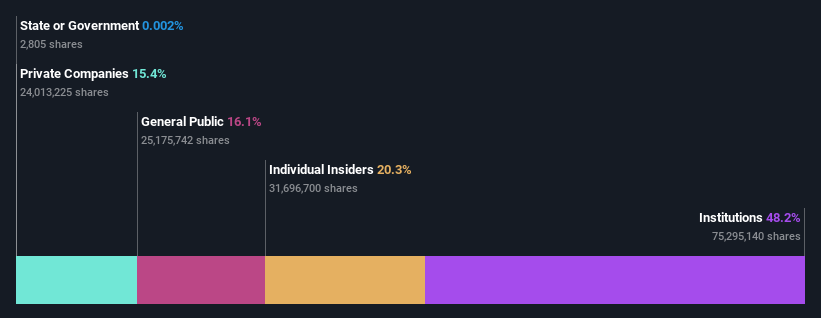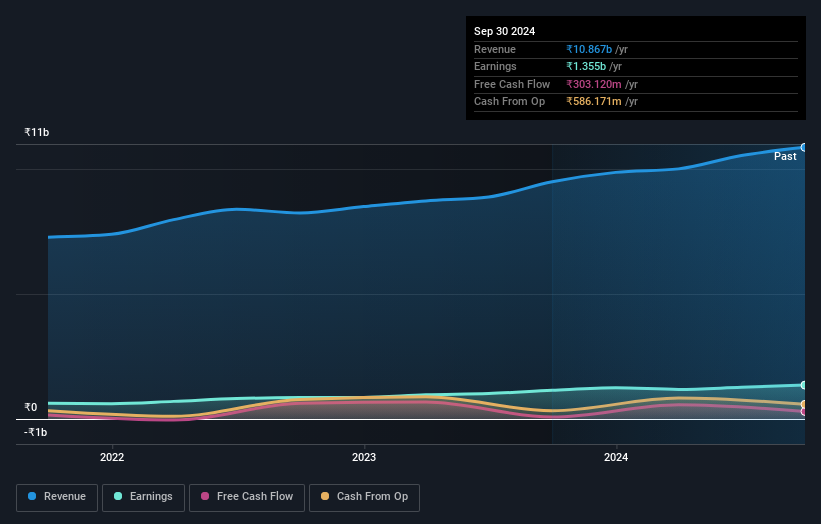- India
- /
- Electrical
- /
- NSEI:TDPOWERSYS
TD Power Systems Limited's (NSE:TDPOWERSYS) institutional investors lost 7.4% last week but have benefitted from longer-term gains
Key Insights
- Institutions' substantial holdings in TD Power Systems implies that they have significant influence over the company's share price
- 50% of the business is held by the top 6 shareholders
- Recent sales by insiders
If you want to know who really controls TD Power Systems Limited (NSE:TDPOWERSYS), then you'll have to look at the makeup of its share registry. With 48% stake, institutions possess the maximum shares in the company. That is, the group stands to benefit the most if the stock rises (or lose the most if there is a downturn).
Institutional investors was the group most impacted after the company's market cap fell to ₹65b last week. Still, the 46% one-year gains may have helped mitigate their overall losses. But they would probably be wary of future losses.
Let's take a closer look to see what the different types of shareholders can tell us about TD Power Systems.
View our latest analysis for TD Power Systems

What Does The Institutional Ownership Tell Us About TD Power Systems?
Institutional investors commonly compare their own returns to the returns of a commonly followed index. So they generally do consider buying larger companies that are included in the relevant benchmark index.
We can see that TD Power Systems does have institutional investors; and they hold a good portion of the company's stock. This implies the analysts working for those institutions have looked at the stock and they like it. But just like anyone else, they could be wrong. When multiple institutions own a stock, there's always a risk that they are in a 'crowded trade'. When such a trade goes wrong, multiple parties may compete to sell stock fast. This risk is higher in a company without a history of growth. You can see TD Power Systems' historic earnings and revenue below, but keep in mind there's always more to the story.

We note that hedge funds don't have a meaningful investment in TD Power Systems. Saphire Finman Services Private Limited is currently the largest shareholder, with 15% of shares outstanding. Nikhil Kumar is the second largest shareholder owning 11% of common stock, and Nippon Life India Asset Management Limited holds about 8.0% of the company stock. Nikhil Kumar, who is the second-largest shareholder, also happens to hold the title of Chief Executive Officer.
We also observed that the top 6 shareholders account for more than half of the share register, with a few smaller shareholders to balance the interests of the larger ones to a certain extent.
While it makes sense to study institutional ownership data for a company, it also makes sense to study analyst sentiments to know which way the wind is blowing. As far as we can tell there isn't analyst coverage of the company, so it is probably flying under the radar.
Insider Ownership Of TD Power Systems
While the precise definition of an insider can be subjective, almost everyone considers board members to be insiders. Company management run the business, but the CEO will answer to the board, even if he or she is a member of it.
Most consider insider ownership a positive because it can indicate the board is well aligned with other shareholders. However, on some occasions too much power is concentrated within this group.
Our information suggests that insiders maintain a significant holding in TD Power Systems Limited. It has a market capitalization of just ₹65b, and insiders have ₹13b worth of shares in their own names. This may suggest that the founders still own a lot of shares. You can click here to see if they have been buying or selling.
General Public Ownership
The general public-- including retail investors -- own 16% stake in the company, and hence can't easily be ignored. This size of ownership, while considerable, may not be enough to change company policy if the decision is not in sync with other large shareholders.
Private Company Ownership
Our data indicates that Private Companies hold 15%, of the company's shares. It might be worth looking deeper into this. If related parties, such as insiders, have an interest in one of these private companies, that should be disclosed in the annual report. Private companies may also have a strategic interest in the company.
Next Steps:
I find it very interesting to look at who exactly owns a company. But to truly gain insight, we need to consider other information, too. Case in point: We've spotted 3 warning signs for TD Power Systems you should be aware of, and 1 of them doesn't sit too well with us.
Of course, you might find a fantastic investment by looking elsewhere. So take a peek at this free list of interesting companies.
NB: Figures in this article are calculated using data from the last twelve months, which refer to the 12-month period ending on the last date of the month the financial statement is dated. This may not be consistent with full year annual report figures.
Valuation is complex, but we're here to simplify it.
Discover if TD Power Systems might be undervalued or overvalued with our detailed analysis, featuring fair value estimates, potential risks, dividends, insider trades, and its financial condition.
Access Free AnalysisHave feedback on this article? Concerned about the content? Get in touch with us directly. Alternatively, email editorial-team (at) simplywallst.com.
This article by Simply Wall St is general in nature. We provide commentary based on historical data and analyst forecasts only using an unbiased methodology and our articles are not intended to be financial advice. It does not constitute a recommendation to buy or sell any stock, and does not take account of your objectives, or your financial situation. We aim to bring you long-term focused analysis driven by fundamental data. Note that our analysis may not factor in the latest price-sensitive company announcements or qualitative material. Simply Wall St has no position in any stocks mentioned.
About NSEI:TDPOWERSYS
TD Power Systems
Manufactures and sells AC generators and electric motors in India, Japan, the United States, Europe, and Turkey.
Outstanding track record with flawless balance sheet.
Market Insights
Community Narratives




